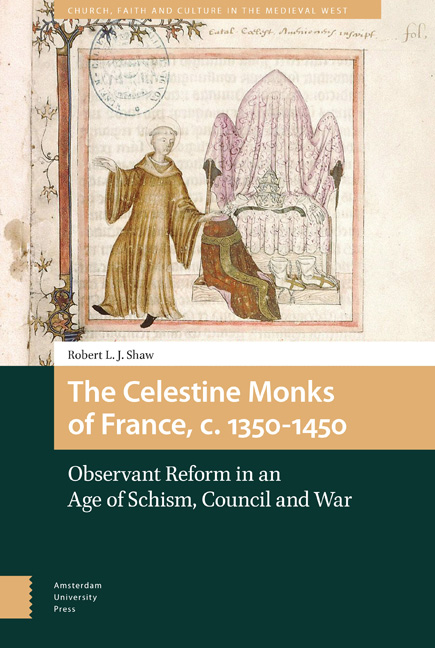Book contents
- Frontmatter
- Contents
- Maps and Figures
- Abbreviations
- Acknowledgements
- Introduction: The Celestine monks of France and the rise of ‘Observant’ reform
- Part I The French Celestines in their world
- Part II The world of the French Celestines
- Epilogue and conclusion
- Appendix 1 Lists and map
- Appendix 2 Reductions of foundation Masses (beyond anniversary Masses) at the Celestine monastery of Paris, 1414 and 1436
- Appendix 3 Reduction of foundation Masses (beyond anniversary masses) at the Celestine monastery of Sens, 1414
- Index
3 - The challenges and adaptation of regular observance
Published online by Cambridge University Press: 16 February 2021
- Frontmatter
- Contents
- Maps and Figures
- Abbreviations
- Acknowledgements
- Introduction: The Celestine monks of France and the rise of ‘Observant’ reform
- Part I The French Celestines in their world
- Part II The world of the French Celestines
- Epilogue and conclusion
- Appendix 1 Lists and map
- Appendix 2 Reductions of foundation Masses (beyond anniversary Masses) at the Celestine monastery of Paris, 1414 and 1436
- Appendix 3 Reduction of foundation Masses (beyond anniversary masses) at the Celestine monastery of Sens, 1414
- Index
Summary
Ascetic standards
The French Celestine constitutions present the image of a congregation concerned with a minute level of ascetic and penitential detail in their pursuit of purity. Nevertheless, the monks were simultaneously being drawn into ever-closer proximity with secular society. If the ascetic standards prescribed by their constitutions were enhanced in the face of this challenge, the inherent tension within this combination deserves to be brought into greater focus on the level of practice. How successful were the French Celestines in upholding their evolving vision of ‘purity’ in this environment? How did discipline operate within their communities? And what can be seen of the knock-on effects of these factors at an individual and communal level?
Rank-and-file discipline
It is not possible to provide anything approaching a complete study on Celestine discipline. The constitutions themselves provide hints of the challenges faced, but the discussions that produced them have not survived. Beyond this, the evidence is anything but comprehensive. One source, however, does stand out: the Celestine chronicle of Metz. Its initial part was written by Nicole de Luttange (d.1439), a long-time procurator of the house and prior in 1438. His work traces the history of the house up to the late fourteenth century and it is continued in the same style by another writer, most likely writing in the 1470s. Their work combines a simple record of the monastery's development and internal events with descriptions of its interactions with the life of the city and the region: professions and deaths of monks, the elevation of new priors and the elections of new provincials are recorded alongside benefactor burials and their founder's pious wishes. The intended audience would seem to have been internal: the work provides a quite candid reminder to the monks of the deeds of their predecessors, whether good or bad, and their place within Metz society. As a result, it provides excellent detail on the challenges of Celestine monastic life within a not untypical urban context.
If the house did not represent a foundation of the very highest elites – its founder was a prominent bourgeois, Bertrand le Hongre –, it was nevertheless founded within the city and its membership had a distinctly bourgeois feel to it, whether drawn from Metz or from elsewhere.
- Type
- Chapter
- Information
- The Celestine Monks of France, c. 1350–1450Observant Reform in an Age of Schism, Council and War, pp. 117 - 162Publisher: Amsterdam University PressPrint publication year: 2018



